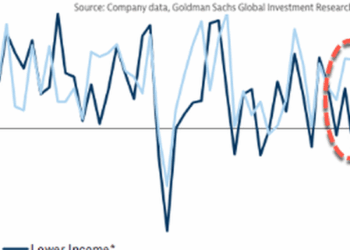Authored by Jacki Thrapp via The Epoch Times (emphasis ours),
A new study revealed that ultraprocessed foods (UPFs) may be linked to a rise in colon cancers among young people across the globe.
The first-of-its-kind study, which took place over 24 years, found that young people who consumed high levels of ultra-processed foods reported a surge in being diagnosed with adenomas and colon polyps, which often lead to colorectal cancer.
“Those with the highest quintile of UPF intake had a statistically significant 45 percent higher odds of early-onset colorectal conventional adenomas compared with the lowest quintile,” the study published Nov. 13 in the journal JAMA Oncology found.
The study followed 29,105 female registered nurses between June 1, 1991, through June 1, 2015. Male nurses were not part of the study.
Overall, 1,189 participants, born between 1947 and 1964, were diagnosed with early-onset conventional adenomas and 1,598 were diagnosed with serrated lesions.
Women who had a higher intake of ultraprocessed foods seemingly had an increased risk of early-onset conventional adenomas but not serrated lesions, the study claimed.
“Our findings support the importance of reducing the intake of ultra-processed foods as a strategy to mitigate the rising burden of early-onset colorectal cancer,” senior author and gastroenterologist Dr. Andrew Chan wrote.
Chan defined ultra-processed foods as “ready-to-eat foods that often contain high levels of sugar, salt, saturated fat and food additives.”
“The increased risk seems to be fairly linear, meaning that the more ultra-processed foods you eat, the more potential that it could lead to colon polyps.”
Not all polyps are cancerous. However, the number of people under 50 being diagnosed with colorectal cancer increased by 2 percent in 2025, according to a report by the American Medical Association in July.
Colorectal cancer incidence rates increased by 500 percent in ages 10 to 14, went up 333 percent in teens aged 15 to 19, and went up 185 percent in young adults aged 20 to 24, the American Medical Association reported over the summer, citing CDC data from 1999 to 2020.
Colon cancer is usually a condition associated with people older than 50, but more and more young people across the world have been diagnosed with early-onset colon cancer, according to the Mayo Clinic.
“In about 20 percent of people with early-onset colon cancer, a genetic condition is the underlying cause. However, most people diagnosed with early-onset colon cancer have no such condition,” the Mayo Clinic reported.
Doctors have noticed that young people being diagnosed with early-onset colon cancer usually have fewer varieties of bacteria in their gut than “healthy people,” used antibiotics early in life, had a high intake of sugary drinks and processed foods while young and spent time at a desk or watching television for hours at a time while young.
Colorectal cancer is the second-leading cause of cancer deaths in the United States.
Loading recommendations…

















